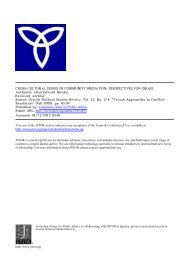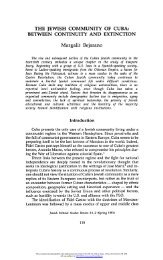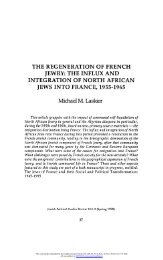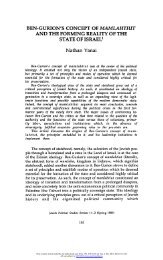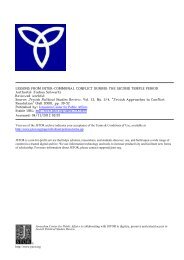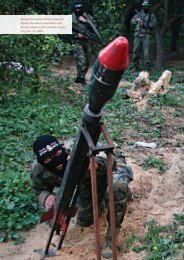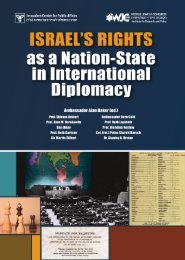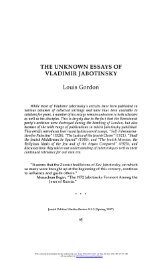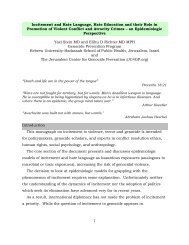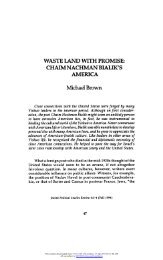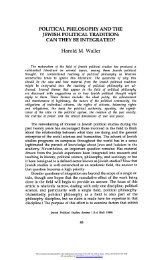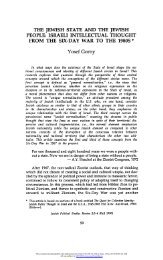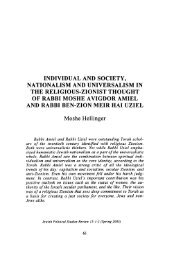Linking the Gaza Strip with the West Bank: - Jerusalem Center For ...
Linking the Gaza Strip with the West Bank: - Jerusalem Center For ...
Linking the Gaza Strip with the West Bank: - Jerusalem Center For ...
You also want an ePaper? Increase the reach of your titles
YUMPU automatically turns print PDFs into web optimized ePapers that Google loves.
page 36III. Israel’s SecurityConsiderationsA. Israel’s Right to Self-DefenseNumerous writers, international conferences, andinternational bodies, have purported to formulate listsof so-called basic (or fundamental) rights and duties ofstates. The basic rights most frequently expressed arethose of independence and equality of states, of territorialjurisdiction, and of self-defense and self-preservation.The basic duties that have been emphasized are those ofnot resorting to war, of carrying out treaty obligations ingood faith, and of not intervening in <strong>the</strong> internal affairsof o<strong>the</strong>r states. 197The basic right that Israel must continually assert is itsright to self-defense. This right not only extends to <strong>the</strong>defense of <strong>the</strong> state, but also to <strong>the</strong> protection of itscitizens. In <strong>the</strong> Olso Agreements <strong>with</strong> <strong>the</strong> Palestinians,this right was recognized and enshrined: Israel was given“<strong>the</strong> responsibility for overall security of Israelis andSettlements, for <strong>the</strong> purpose of safeguarding <strong>the</strong>ir internalsecurity and public order” and granted “all <strong>the</strong> powers totake <strong>the</strong> steps necessary to meet this responsibility.” 198Terrorism poses a threat not only to <strong>the</strong> lives of Israelicitizens, but also to <strong>the</strong> very existence of <strong>the</strong> State. Suchterrorism is only likely to increase <strong>with</strong> <strong>the</strong> creation ofsafe passage. This threat of terrorism was aggravatedby Hamas’ victory in <strong>the</strong> Palestinian legislative electionsheld on January 25, 2006 and <strong>the</strong>ir subsequent authorityin <strong>the</strong> <strong>Gaza</strong> <strong>Strip</strong>.The Hamas Charter containsstatements such as “[o]urstruggle against <strong>the</strong> Jews isvery great and serious,” andcalls for raising “<strong>the</strong> bannerof Allah over every inch ofPalestine.” 199Of more concern is <strong>the</strong> line stating that “[t]he ProphetAllah … has said: ‘[t]he Day of Judgment will not comeabout until Muslims fight <strong>the</strong> Jews, when <strong>the</strong> Jew willhide behind stones and trees. The stones and trees willsay, O Muslims, O Abdulla, <strong>the</strong>re is a Jew behind me,come and kill him.’” 200 Before Hamas’ electoral victory,security officials described <strong>the</strong>ir possible ascendancyas a “no-win situation” 201 and asserted that Hamaswould never agree to recognize <strong>the</strong> State of Israel or putterror aside. 202 Today, more than fourteen months after<strong>the</strong> elections, Hamas’ stance has not changed. In thiscurrent political reality Israel’s inherent right of selfdefensebecomes even more essential.It is not surprising, facing this reality, that IDF GeneralAmos Gilad implied that in order to exercise its right ofself-defense Israel needs more than sovereignty overany future safe passage. She also requires control over<strong>the</strong> crossing points that provide access to such passage.Only <strong>with</strong> such control can Israel effectively defendherself and her citizens, by determining who can use<strong>the</strong> safe passage, what <strong>the</strong>y can carry <strong>with</strong> <strong>the</strong>m, andensuring that such standards are reliably implemented.International law appears to support Gilad’s assertion.However, some might argue that this control of <strong>the</strong>crossing points will interfere in <strong>the</strong> affairs of ano<strong>the</strong>rstate -- <strong>the</strong> future Palestinian State. While at firstglance this might seem to be implied from <strong>the</strong> dutynot to intervene in <strong>the</strong> affairs of o<strong>the</strong>r states, a properunderstanding of this duty suggests that in fact this isnot its intended meaning.International law generally forbids intervention by onestate in <strong>the</strong> affairs of ano<strong>the</strong>r. The intervention that isso prohibited is understood as something less thanaggression but more than mere interference, and muchstronger than mediation or diplomatic suggestion. Tofall <strong>with</strong>in <strong>the</strong> prohibited realm of intervention, <strong>the</strong>intervention generally speaking must be against <strong>the</strong> willof <strong>the</strong> particular state affected, and almost always, asclarified by <strong>the</strong> International Court of Justice in <strong>the</strong> caseof Nicaragua v. United States of America, serving by designor implication to impair <strong>the</strong> political independence ofthat state. 203



